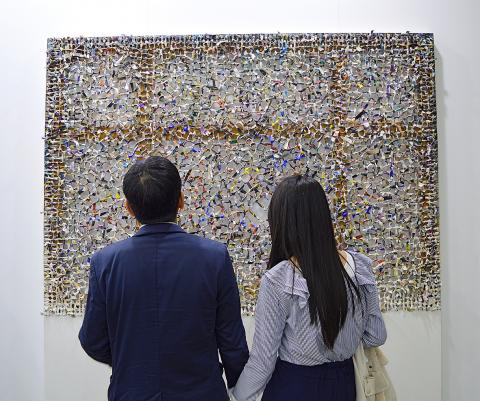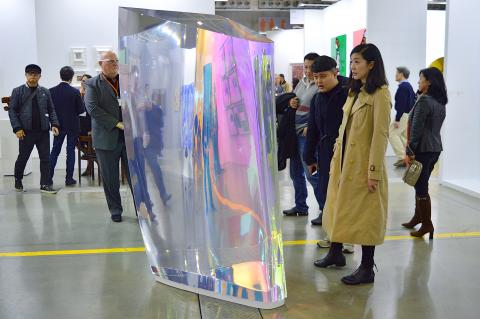Following the success of last year’s inaugural event, Taipei Dangdai (台北當代) is back for its second edition today through Sunday. The contemporary art fair presents renowned and young galleries, as well as solo exhibitions from the likes of Christopher Le Brun, recent president of the Royal Academy of Arts. The fair is complete with a salon section, where collectors can choose from artworks starting from US$8,000.
During this time, contemporary art will take over many sites in Taipei, including a light show at Taipei 101, designed by Tokyo-born Taiwanese artist Michael Lin (林明弘), from 6:30pm to 7pm every evening. Other off-site highlights include a major installation by Chinese artist Ai Wei Wei (艾未未) at Chambers Fine Art and Zhao Gang’s (趙剛) exhibition presented at Each Modern.
Ticket holders may attend talks with artists at Dangdai’s Ideas Program, focusing on the fair’s central themes: technology, ecology, pop and tradition. Highlights include a talk with Colombian artist Oscar Murillo, whose works focus on universal human experiences in an increasingly globalized world. Guided tours are also available in Chinese and English. Pre-booking is essential due to the limited number of participants per tour.

Photo: Ella Csarno
■ 1am to 6pm today and tomorrow, 11am to 5:30pm Sunday, Taipei World Trade Center Nangang Exhibition Hall (台北世界貿易中心南港展覽館), 1 Jingmao 2nd Rd, Taipei City (台北市經貿二路1號)
■ Advance tickets are NT$550 for today and NT$625 for tomorrow and Sunday, NT$750 at the door. For more information, visit /taipeidangdai.com

Photo: Ella Csarno

April 14 to April 20 In March 1947, Sising Katadrepan urged the government to drop the “high mountain people” (高山族) designation for Indigenous Taiwanese and refer to them as “Taiwan people” (台灣族). He considered the term derogatory, arguing that it made them sound like animals. The Taiwan Provincial Government agreed to stop using the term, stating that Indigenous Taiwanese suffered all sorts of discrimination and oppression under the Japanese and were forced to live in the mountains as outsiders to society. Now, under the new regime, they would be seen as equals, thus they should be henceforth

Last week, the the National Immigration Agency (NIA) told the legislature that more than 10,000 naturalized Taiwanese citizens from the People’s Republic of China (PRC) risked having their citizenship revoked if they failed to provide proof that they had renounced their Chinese household registration within the next three months. Renunciation is required under the Act Governing Relations Between the People of the Taiwan Area and the Mainland Area (臺灣地區與大陸地區人民關係條例), as amended in 2004, though it was only a legal requirement after 2000. Prior to that, it had been only an administrative requirement since the Nationality Act (國籍法) was established in

With over 80 works on display, this is Louise Bourgeois’ first solo show in Taiwan. Visitors are invited to traverse her world of love and hate, vengeance and acceptance, trauma and reconciliation. Dominating the entrance, the nine-foot-tall Crouching Spider (2003) greets visitors. The creature looms behind the glass facade, symbolic protector and gatekeeper to the intimate journey ahead. Bourgeois, best known for her giant spider sculptures, is one of the most influential artist of the twentieth century. Blending vulnerability and defiance through themes of sexuality, trauma and identity, her work reshaped the landscape of contemporary art with fearless honesty. “People are influenced by

Three big changes have transformed the landscape of Taiwan’s local patronage factions: Increasing Democratic Progressive Party (DPP) involvement, rising new factions and the Chinese Nationalist Party’s (KMT) significantly weakened control. GREEN FACTIONS It is said that “south of the Zhuoshui River (濁水溪), there is no blue-green divide,” meaning that from Yunlin County south there is no difference between KMT and DPP politicians. This is not always true, but there is more than a grain of truth to it. Traditionally, DPP factions are viewed as national entities, with their primary function to secure plum positions in the party and government. This is not unusual